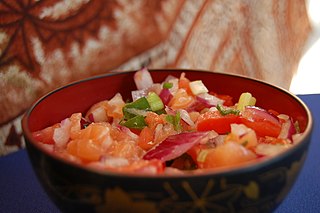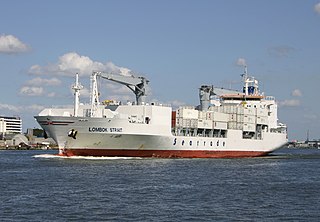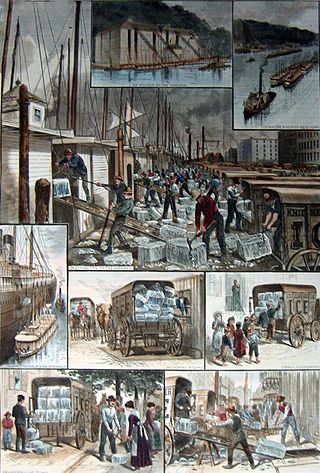Ralph Milbanke Hudson | |
|---|---|
 | |
| Born | 1848 or 1849 |
| Died | 6 March 1938 (aged 89) |
| Occupations |
|
| Political party | Conservative |
Ralph Milbanke Hudson (1849 — 6 March 1938) was an English shipowner and politician.
Ralph Milbanke Hudson | |
|---|---|
 | |
| Born | 1848 or 1849 |
| Died | 6 March 1938 (aged 89) |
| Occupations |
|
| Political party | Conservative |
Ralph Milbanke Hudson (1849 — 6 March 1938) was an English shipowner and politician.
He was born in 1849 in The Boldons, the son of Ralph Milbanke Hudson the elder, of Oak Lea, Witton Gilbert, County Durham. [1] [2] He was educated privately and abroad. [1]
Hudson joined the family shipowning business, R. M. Hudson & Sons, of Tavistock House, Sunderland. [1] From 1882 he was a member of the River Wear Commissioners, representing coal owners. [1] [2]
In 1895, the company, with other British partners, bought into meat-packing premises on the River Plate; [3] and the SS Meath and SS Wexford began in the meat trade with Argentina, to 1886, followed by a period where they were chartered more generally. [4] By 1912, R. M. Hudson & Sons was running a regular cargo trade with Argentina. [5]
In 1918, Hudson was elected as Unionist Member of Parliament for Sunderland. He held the seat until 1922. [6]
He represented Sunderland with Lloyds Register of Shipping, was chairman of the finance committee of the Shipping Federation, and a member of the council of the International Shipping Federation. [2]
Hudson married, in 1883, Eliza Westropp Palliser, daughter of Graham Palliser of Plymouth. [1]
![]() Media related to Ralph Milbanke Hudson junior at Wikimedia Commons
Media related to Ralph Milbanke Hudson junior at Wikimedia Commons

Freezing food preserves it from the time it is prepared to the time it is eaten. Since early times, farmers, fishermen, and trappers have preserved grains and produce in unheated buildings during the winter season. Freezing food slows decomposition by turning residual moisture into ice, inhibiting the growth of most bacterial species. In the food commodity industry, there are two processes: mechanical and cryogenic. The freezing kinetics is important to preserve the food quality and texture. Quicker freezing generates smaller ice crystals and maintains cellular structure. Cryogenic freezing is the quickest freezing technology available due to the ultra low liquid nitrogen temperature −196 °C (−320 °F).

A frozen meal, prepackaged meal, ready-made meal, ready meal (UK), frozen dinner, and microwave meal is ultra-processed food portioned for an individual. A frozen meal in the United States and Canada usually consists of a type of meat, fish, or pasta for the main course, and sometimes vegetables, potatoes, and/or a dessert. Some frozen meals feature Indian, Chinese, Mexican, and other foods of international customs. Another form of convenience food, which is merely a refrigerated ready meal that requires less heating but expires sooner, is popular.

Food processing is the transformation of agricultural products into food, or of one form of food into other forms. Food processing takes many forms, from grinding grain into raw flour, home cooking, and complex industrial methods used in the making of convenience foods. Some food processing methods play important roles in reducing food waste and improving food preservation, thus reducing the total environmental impact of agriculture and improving food security.
Following is a list of dates in the history of Sunderland, the ancient city in North East England. Facts and figures, important dates in Sunderland's history.

Lomi lomi salmon is a side dish in Hawaiian cuisine containing salted salmon, onions, and tomatoes. Its origin is similar to poisson cru. It also resembles pico de gallo in appearance and to how it is often consumed as an accompaniment to other foods such as poi or kalua pork.

The Palliser expedition, officially the British North American Exploring Expedition, explored and surveyed the open prairies and rugged wilderness of western Canada from 1857 to 1860. The expedition was led by Irish-born explorer John Palliser, and accompanied by a party of four other men: James Hector, Eugène Bourgeau, Thomas Blakiston and John W. Sullivan. With the support of the British government and the Royal Geographical Society it became an official expedition with the stated purpose of gathering scientific information about the landscapes of British-claimed north-western North America, in particular the territory of Rupert's Land, including information on the geography, climate, soil, flora and fauna, in order to discover its capabilities for settlement and transportation.

A reefer ship is a refrigerated cargo ship typically used to transport perishable cargo, which require temperature-controlled handling, such as fruits, meat, vegetables, dairy products, and similar items.

Thomas Sutcliffe Mort was an Australian industrialist who improved the refrigeration of meat. He was renowned for speculation in the local pastoral industry as well as industrial activities such as his Ice-Works in Sydney's Darling Harbour and dry dock and engineering works at Balmain.
The Maldives Industrial Fisheries Company, MIFCO, is a public company engaged in the production, processing and marketing of fish and fishery products. The company was incorporated in 1993.

An entremet or entremets in Medieval French cuisine referred to dishes served between the courses of the meal, often illusion foods and edible scenic displays. The term additionally referred to performances and entertainments presented between the courses. After the mid-17th century, the term referred to certain types of savory and sweet culinary preparations, and to the stage of the meal in “Classical Service” when they were served. Since the early 20th century, the term has more commonly referred only to the sweet preparations of the entremets stage of the meal.

The Dunedin (1874–90) was the first ship to successfully transport a full cargo of refrigerated meat from New Zealand to England. In this capacity, it provided the impetus to develop the capacity of New Zealand as a major provider of agricultural exports, notwithstanding its remoteness from most markets. Dunedin disappeared at sea in 1890.

The term fish processing refers to the processes associated with fish and fish products between the time fish are caught or harvested, and the time the final product is delivered to the customer. Although the term refers specifically to fish, in practice it is extended to cover any aquatic organisms harvested for commercial purposes, whether caught in wild fisheries or harvested from aquaculture or fish farming.

The ice trade, also known as the frozen water trade, was a 19th-century and early 20th-century industry, centering on the east coast of the United States and Norway, involving the large-scale harvesting, transport and sale of natural ice, and later the making and sale of artificial ice, for domestic consumption and commercial purposes. Ice was cut from the surface of ponds and streams, then stored in ice houses, before being sent on by ship, barge or railroad to its final destination around the world.
The New Zealand Meat Board is a statutory body which provides quota management on behalf of the Crown for meat exports to the United States, European Union and United Kingdom. To protect their own livestock industry these countries give limited access to New Zealand meat exports.

Shark meat is a seafood consisting of the flesh of sharks. Several sharks are fished for human consumption, such as porbeagles, shortfin mako shark, requiem shark, and thresher shark, among others. Shark meat is popular in Asia, where it is often consumed dried, smoked, or salted. Shark meat is consumed regularly in Iceland, Japan, Australia, parts of India, parts of Canada, Sri Lanka, areas of Africa, Mexico and Yemen.
Nelson Brothers Limited meat processors and importers was incorporated in London in 1883 to purchase as of 1 July 1883 the meat works at Tomoana, Hawkes Bay. These boiling down and canning works erected in 1880 were run as Nelson Brothers and Co by William Nelson, his brother Frederick Nelson (1839–1908) and their partner, J N Williams later of Frimley, Hastings.

Ganteaume's expedition of 1795 was a French naval operation in the Aegean Sea in the autumn of 1795 during the French Revolutionary Wars. Commanded by Commodore Honoré Ganteaume in the ship of the line Républicain, with a squadron of four frigates and two corvettes, the French force was ordered to attack First Coalition shipping in the Aegean Sea. The principal target was the Ottoman city of Smyrna, the most significant trading port of the region, Ganteaume ordered to prey on merchant shipping sailing for European destinations and in particular a large convoy due to sail to Britain.

Palatine Lodge No. 97 is a Craft Masonic Lodge in Freemasonry under the jurisdiction of the United Grand Lodge of England. The lodge meets at Wearside Masonic Temple, Burdon Road, Sunderland and has done so since 1932. Previously the lodge met at the Masonic Hall in Park Terrace, which was dismantled in 1988, rebuilt and opened in April 2000 at the Beamish Open Air Museum, Stanley, County Durham, England.
William Russell (1734–1817) was an English merchant, coal-fitter and banker. He first went into business as a merchant in Sunderland. He then made a substantial personal fortune from coal mining.

The Foreign Cattle Market, Deptford (1872–1913) was one of the two great livestock markets of London; from it came about half the capital's supply of freshly killed meat. Situated at the former royal Deptford Dockyard on a bend of the River Thames and owned by the City of London, all animals came from overseas, were landed by cattle boat, kept under quarantine conditions, and had to be slaughtered within 10 days of disembarkation. None could leave the market alive: the purpose was to stop the importation of animal diseases. Besides cattle, the market handled sheep, pigs and a few others. It could shelter 8,500 cattle and 20,000 sheep at a time, and had 70 slaughterhouses.